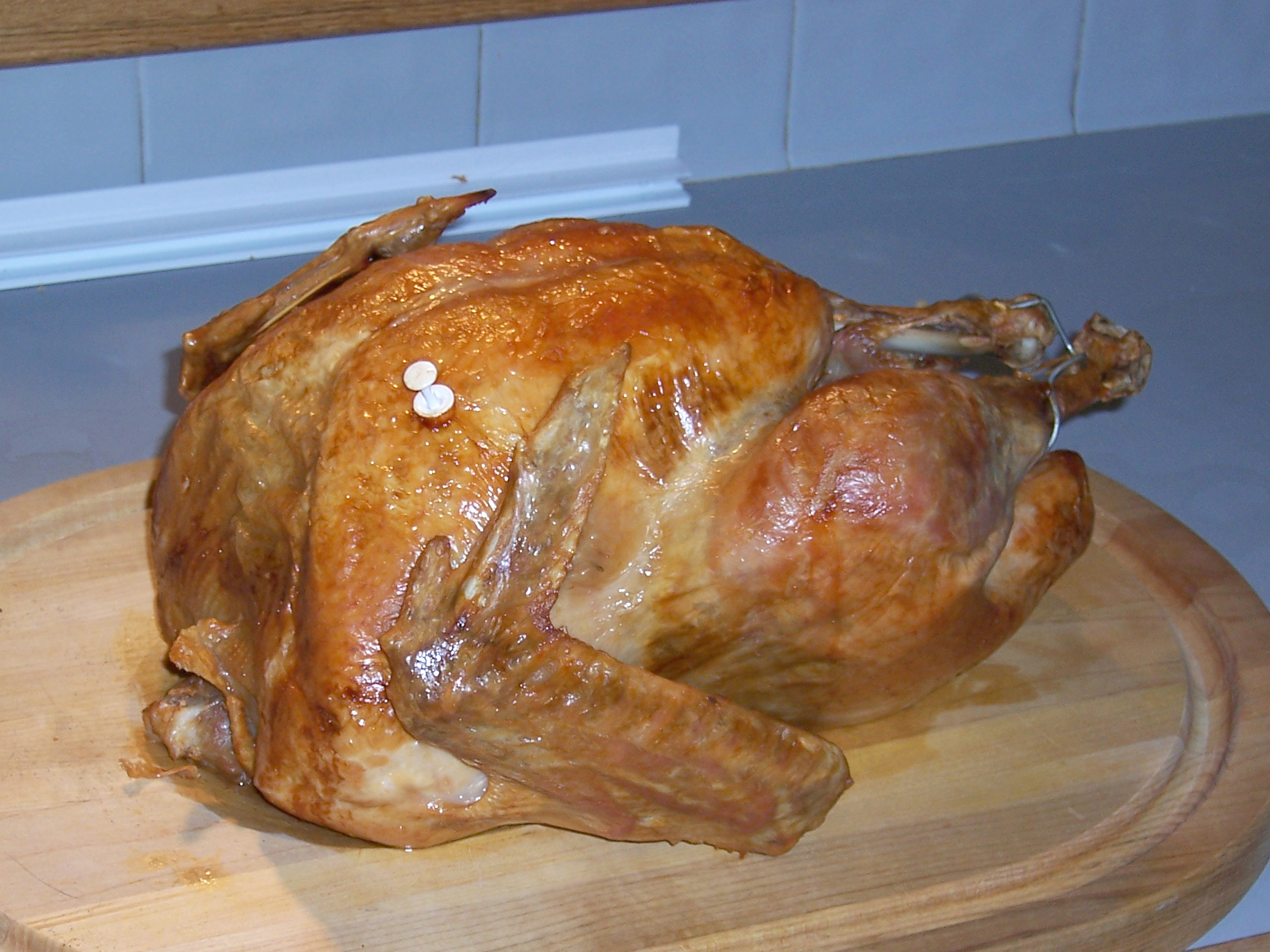Nutrition for Turkey (cooked)
Calories, Protein, Vitamins and More
Turkey Nutrition Summary
One lb of cooked turkey (453.3 grams) contains 857 calories and 129.4 grams of protein. Turkey consist of 64% water, 29% protein, 7% fat, and less than 1% of carbohydrates.Turkey is an excellent source of many nutrients, including protein, calcium, iron, potassium, riboflavin, niacin, Vitamin B6, pantothenic acid and Vitamin B12. It also contains significant amounts of Vitamin D, magnesium, choline, phosphorus, selenium, zinc and copper.
In one lb of cooked turkey:
- Calories: 857
- Protein: 129.4 g
- Fat: 33.5 g, (Saturated: 9.8 g)
- Cholesterol: 494.1 mg
- Sodium: 466.9 mg
See the Turkey Nutrition Chart for complete recommended daily values.
The specific nutritional values from USDA is for: Turkey, whole, meat and skin, cooked, roasted.
Calories in Turkey
Turkey has 857 calories per lb or 189 calories for every 100 grams. Most of its calories are from protein and fat.63% of calories in turkey are from protein and 37% of calories are from fat.
Calories from Fat
A substantial amount, or 37% of the calories in cooked Turkey are from fat. Turkey has a moderate amount of total fat, with 33.5 grams or 52% of recommended daily values per lb. Most of the fat in turkey are healthier unsaturated fats but it also contains a high amount of saturated fat, about 50% of recommended daily values.
Turkey contains 0.4578128 grams of trans fat and494.1 mg of cholesterol.
Turkey contains 0.4578128 grams of trans fat and494.1 mg of cholesterol.
- Total fat: 33.5 g
- Cholesterol: 494.1 mg
- Trans fat: 0.5 g
- Saturated fat: 9.8 g
- Monounsaturated fat: 12 g
- Polyunsaturated fat: 9.6 g
Omega-3 and Omega-6 in Turkey
Turkey is a source of healthy omega-3 fatty acids, containing a total of 0.49 grams for every lb. It contains significant amounts of alpha linoleic acid.
[2]
- alpha linoleic acid: 0.49 g
Also a good source of omega-6 fatty acids, every lb of turkey contains a total of 8.8 grams of omega-6. In addition, a large portion of the omega-6 in turkey comes from linolenic acid - the only essential omega-6 fatty acid.
[2]
- linoleic acid: 8.49 g
- other omega 6: 0.34 g
Calories Similar to Turkey
Some other proteins with similar calories to turkey by weight:- Chicken: same
- Prosciutto: +27 calories
- Rabbit: -77 calories
- Chicken Leg: +113 calories
Protein in Turkey
An excellent source of protein, a single lb of Turkey contains 259% of recommended daily values or 129.4 grams of protein. In addition, turkey is also a source of complete protein, meaning it abundantly contains all 9 essential amino acids.- Protein: 129.41 g
- Tryptophan: 1.32 g
- Threonine: 4.55 g
- Isoleucine: 3.61 g
- Leucine: 8.73 g
- Lysine: 10.34 g
- Methionine: 3.28 g
- Phenylalanine: 4.09 g
- Valine: 4.09 g
- Histidine: 3.4 g
Protein Similar to Turkey
Some other proteins with similar amounts of protein to turkey by weight:- Bison: -0.5 grams
- Prosciutto: -3.4 grams
- Venison: +5.7 grams
- Chicken Breast: +11 grams
Vitamins and Minerals in Turkey
An good source of many nutrients, cooked turkey contains abundant amounts of calcium, iron, potassium, riboflavin, niacin, Vitamin B6 and Vitamin B12. In fact, a single lb of turkey contains 310% of recommended daily values or 43.4 milligrams of niacin. Also an excellent source of riboflavin, a single lb of turkey contains 116% of recommended daily values or 1.3 milligrams of riboflavin.Vitamins in turkey (1 lb):
- Vitamin a: 54.4 ug
- Thiamin: 0.2 mg
- Riboflavin: 1.3 mg
- Niacin: 43.4 mg
- Vitamin b6: 2.8 mg
- Vitamin e: 0.3 mg
- Folate: 40.8 ug
- Vitamin b12: 4.6 ug
- Calcium: 63.5 mg
- Potassium: 1083.3 mg
- Iron: 4.9 mg
- Magnesium: 136 mg
- Zinc: 11.2 mg
- Selenium: 135.1 ug
- Phosphorus: 1010.8 mg
- Copper: 0.4 mg
- Manganese: 0.1 mg
- Choline: 396.2 mg
Similar to Turkey for Niacin (Vit B3)
Here are some other proteins with similarly abundant amounts of niacin (Vit B3) to turkey:Turkey Nutrition Chart
|
Turkey:
( -
g )
|
||
|---|---|---|
| calories |
|
KCAL % |
| carbohydrates |
|
G % |
| total fat |
|
G % |
| saturated fat |
|
G % |
| monounsaturated fat | G | |
| polyunsaturated fat | G | |
| trans fat | G | |
| protein |
|
G % |
| cholesterol | MG | |
| sodium |
|
MG % |
| Vitamin A |
|
UG % |
| Vitamin D |
|
IU % |
| calcium |
|
MG % |
| iron |
|
MG % |
| magnesium |
|
MG % |
| potassium |
|
MG % |
| thiamin (Vitamin B1) |
|
MG % |
| riboflavin (Vitamin B2) |
|
MG % |
| niacin (Vitamin B3) |
|
MG % |
| Vitamin B6 |
|
MG % |
| pantothenic acid (Vitamin B5) |
|
MG % |
| folate (Vitamin B9) |
|
UG % |
| Vitamin B12 |
|
UG % |
| Vitamin E |
|
MG % |
| histidine |
|
G % |
| isoleucine |
|
G % |
| leucine |
|
G % |
| lysine |
|
G % |
| methionine |
|
G % |
| phenylalanine |
|
G % |
| threonine |
|
G % |
| tryptophan |
|
G % |
| valine |
|
G % |
| manganese |
|
MG % |
| choline |
|
MG % |
| phosphorus |
|
MG % |
| selenium |
|
UG % |
| zinc |
|
MG % |
| Water | G | |
| copper |
|
MG % |
